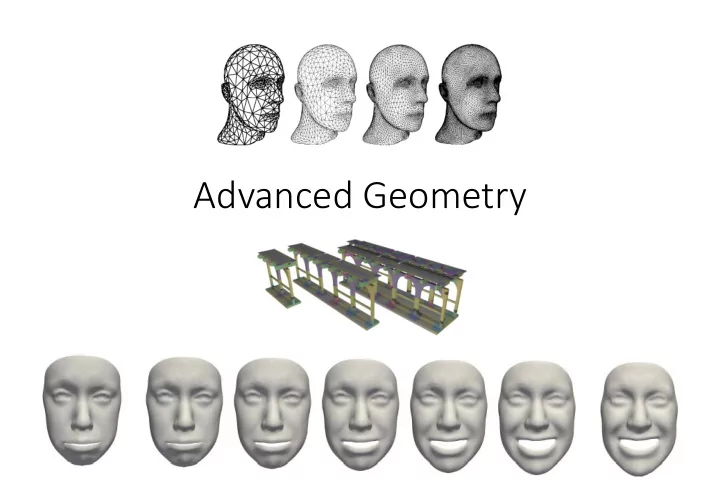

Advanced Geometry
Topics 1. Automatic content creation [Liu et al. Eurographics 2015] 2. Level-of-detail representations 2
Content creation 3
Traditional manual approach • Use of 3D modeling software • Manually define geometry and materials • Compose model of multiple primitives • Requires expertise and time, Example image of modeled fish from Wikipedia. expensive 4
Automatic content creation Main idea • Generate 3D models without manual modeling • Two options 1. Measuring real-world objects 2. Modifying existing 3D models 5
Measuring real-world objects 6
Traditional Acquisition Techniques • Small set of discrete measurements • Used in different applications Anthropometric measurements Surveying • Main advantage Easy to acquire and process measurements • Main disadvantage Impossible to get a detailed shape description
3D Scanners • New technology • 3D (animation) scanners • Record 3D video • Active research area • Powerful tool • Preserve artwork / historic artifacts [P. Jenke, WSI/GRIS Tübingen] • Acquire populations of 3D shapes for analysis
Types of 3D Scanners Scanning Techniques: o Time-of-flight Time-of-flight laser scanner Time-of-flight depth cameras (dynamic) o Triangulation Laser line sweep Structured light o Stereo / computer vision Passive stereo Active stereo / space time stereo Other techniques
Example Scan (time of flight laser scanner) [data set: University of Hannover]
Example scan (structured light scanner) color-coded motion compensated structured light structured light courtesy of Phil Fong, courtesy of Sören König, Stanford University TU Dresden
Example scan (active stereo scanner)
Example scan (stereo reconstruction) multi view matching (6 cameras) multi view matching (8 cameras) (photo-consistent space carving) (piecewise smooth variational surface on presegmented images [Data set: Christan Theobald, MPII, 2006] solved with Bayesian belief propagation) [Data set: Zitnick et al., Microsoft Research, Siggraph 2004]
Processing the scans To be useful, the scans need to be processed o Hole filling o Outlier removal o … o Many methods and software libraries available 14
Allows for direct content creation 15
Modifying existing 3D models 16
Possibilities • Common possibilities o Extrapolation o Interpolation o Structure-aware modification • Many possibilities, active area of research 17
Exercise Propose a way to interpolate and extrapolate between two 3D shapes • How do you represent the shapes? • What interpolation / extrapolation equation to use? • What are the advantages and disadvantages of the method? 18
Shape interpolation and extrapolation • Possible in shape space using correspondence information 19
Statistical shape spaces possible • Learn statistical distribution of geometry of shape • Use this information for synthesis 20
Structure-aware modification Challenge o Direct point-to-point correspondence cannot be established o Point-wise or triangle-wise modification not meaningful Liu et al. Eurographics 2015 o Active area of research 21
Take advantage of symmetry information Kalojanov et al. SGP 2012 22
Decompose into basic building blocks Liu et al. Eurographics 2015 23
Level-of-detail representations 24
Key idea Distance from camera = less geometric detail required 25
Subdivision surfaces • We saw them already • Advantages o Very strong geometric compression (4 triangles become 1) o Theoretical convergence properties • Disadvantages o Not applicable to downsample shapes that do not have this structure 26
Edge collapse • Models can be downsampled by sequence of edge collapses [Hoppe, Progressive Meshes, SIGGRAPH 1996] 27
Example result [Hoppe, Progressive Meshes, SIGGRAPH 1996] 28
Recommend
More recommend